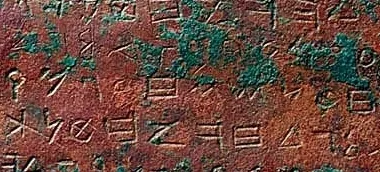Search form
April 2013
The Racist Right with Mike Delaney - 04-26-2013
 The Saxon Messenger editorial article which expresses the basis for this program is found here: https://next.christogenea.org/articles/racist-right
The Saxon Messenger editorial article which expresses the basis for this program is found here: https://next.christogenea.org/articles/racist-right
William Finck and Mike Delaney of Prothink.org and Trutube.tv in a discussion of true truth and conservatism in contrast with some of the "anti-zionists" in the so-called "truth movement" who are not truly conservative at all and who actually work against White interests.
William Finck on Alba Voce with David Baillie
![]() Click here for the program page.
Click here for the program page.
Tonight David Baillie welcomes William Finck, Biblical scholar, broadcaster and author of Christogenea.org, to discuss Christianity's true origins, the migrations of the Israelites, how modern day Christianity has been twisted and used as a weapon to deceive White Western Civilization into submitting to non-White rule. We will also discuss how Christianity initially united White European civilization and served as a bulwark against invasions by other races. Lastly, we will discuss the importance of Christianity in general to the White Nationalist community, and in specific the role that Christian Identity can play in turning Christianity back into a shield for White nations.
The caller at the end of the program turns out to be a Judaized half-breed of some sort or other. We did not know that at first and therefore treated him as if he may have been a White man. We answered him harshly for good intent. The first questions we would pose in regard to any criticism of our handling of this caller are these: Should Christian pastors remain aloof from the harsh realities of society? Should Christian pastors merely repeat the kind words of Jesus in spite of what is going on in the world? Or should Christian pastors identify the sheep and distinguish them from the wolves, goats and dogs which are destroying the sheep? We have an obligation to face the harsh realities of the world, and warn the sheep accordingly. The goats are destined for the Lake of Fire, and we also know who they are.
Book of Acts Chapter 1, Part 2
The opening remarks to this podcast, entitled What Is Universalism?, are found here on the Christogenea Forum.
The Book of Acts, Chapter 1 Part 2 – Christogenea Internet Radio, April 19th, 2013
Discussing Amos chapter 3 here last month, we presented a lengthy dissertation concerning the Biblical phrase “all the families of the earth”, and from many scriptures found in both the Old and New Testaments it was demonstrated that within the Biblical context, the use of the phrase can only be applied to that group of White Adamic Nations which is listed in Genesis chapter 10. It can not be applied to anyone outside of that group. As Genesis 5:1 says, “This is the book of the generations of Adam.” The listing of those generations (which is the Hebrew word toledah, Strong's number 8435, meaning descendants) found in Genesis chapter 10 are a part of that book, and none of the promises made to those people, families and nations - such as those made to Abraham in Genesis chapter 12 - can ever justly be applied to anyone else.
George Washington on the Jews, the "Tribe of Black Gentry"
The quotes below are from George Washington's maxims on finance, extracted from The Maxims of Washington; Political, Social, Moral and Religious. Collected and Arranged by John Frederick Schroeder, D.D. and published by D. Appleton and Company in 1854: While he doesn't mention the Jews explicitly, George Washington warned about the "tribe of black gentry", by whom he certainly meant the jews.
"This tribe of black gentry work more effectually against us, than the enemy’s arms.They are a hundred times more dangerous to our liberties. and the great cause we are engaged in." - George Washington, 1779 [pp. 125-126]
Book of Acts Chapter 1, Part 1
The Book of Acts, Chapter 1 – Christogenea Internet Radio, April 11th, 2013
The Book of the Acts of the Apostles, as it is fully called, is a book of transition. It records a transition of the legitimate faith in Yahweh God, as decreed by His Word, from the tenets of Hebraism to the constructs of Christianity; from the rituals of the laws of the Old Covenant to a faith in the Word of God in Christ which was promised by the prophets of the Old Covenant, and which was recorded in the Gospel of the New Covenant. This faith in Christ would include the Christian recognition of a need for conformance to the commandments of Christ, found in those original ten commandments and the admonition to love one's brother. It records a transition of the primary subject of the Word of God from the remnant of Jerusalem to the dispersion of the children of Israel, the “lost sheep” of the ancient dispersions. That is what the New Testament is, it is the record of the Gospel of the New Covenant between Yahweh God and His people Israel, which was explicitly promised in the prophets at Jeremiah 31:31, Ezekiel 37:26 and Daniel 9:27. It was implicitly promised in many of the other writings of the prophets. We know that these Gospels do indeed represent the promised New Covenant since they came at the appropriate time, which was outlined in the 70 weeks vision of Daniel chapter 9.
There should be no doubt that the apostle called Luke wrote Acts. The author claims to be the writer of the Gospel, “that first account” mentioned in the opening of the Book of Acts. The Greek style is precisely the same which is found in the Gospel written in his name. Paul tells us that Luke was with him at his imprisonment (Philemon 24), and from Acts we see that Luke was there when this happened (Acts 27:1). Luke was with Paul, at the least, from Acts 16:10-17, 20:5-21:18, and 27:1-28:16 (to the end of the book). Paul is arrested in Acts Chapter 21, and the balance of the book follows his imprisonment as far as Rome. No other companion of Paul’s meets all of these criteria. Luke is also mentioned by Paul at Colossians 4:14 and 2 Timothy 4:11. Acts was written to be an extension of Luke's Gospel. It can justly be called Luke, Part Two. It is written to the same audience, the “lover of God” whom Luke addresses in his Gospel. More will be said about that as we get into the opening verses of the book.
Earliest Greek Writing is Phoenician
Image

"Now the Phoenicians who came with Cadmus, and to whom the Gephyraei belonged, introduced into Greece upon their arrival a great variety of arts, among the rest of that writing, whereof the Greeks till then had, as I think, been ignorant." - Herodotus, The Histories, 5:58, George Rawlinson, translator
This engraved piece of copper, known as Manuscript 108, represents the earliest known writing in Greece. It's clear relationship to the Hebrew-Phoenician North Semitic alphabet also substantiates the testimony of many ancient Greek writers who attest that the Greek alphabet was developed from the Phoenician.
Image

"An ABECEDARY contemporary with Homer, an amazing preservation of students' learning of the Greek alphabet at the very inception of its use. The Alphabet is repeated over and over, and contains the North Semitic (Phoenician) number of letters (22), ayin/aleph to taw/tau in Phoenician and Greek order, written in continuous retrograde lines. It represents the earliest and most complete link between Greek letter forms and the North Semitic parent forms." (THE SCHØYEN COLLECTION)
In all fairness, we must state that there is an inscription extant with competing claims to be the oldest Greek alphabet, called the Dispilio Tablet. Claims have been made that this tablet is over 7000 years old. While that would not upset our worldview, that the Greek alphabet of 700 BC came from the Hebrew is clear not only in the shapes of the characters and the sounds they represent, but also in the names of the characters, the order they were drawn, and in the many historical accounts of the Greeks themselves.
While some of the character forms in the Dispilio Tablet are familiar, to us they seem to represent a strange hybrid of shapes similar to some of the Hebrew-Phoenician forms along with other characters which seem to be more closely related to some sort of primitive cuneiform. It cannot be said that they represent any direct ancestor of the later Phoenician or Greek alphabets, especially since there is no certainty of what the characters may represent.
If the Dispilio Tablet were indeed of the antiquity which is claimed, in our opinion we may perceive it as a precursor or a very early offshoot of some unknown proto-Mesopotamian script. However claims for the antiquity of the Dispilio Tablet cannot be made with the confidence that its discoverers exude. Carbon dating is simply not as accurate as many of its proponents believe. Additionally, even if the wood is of great antiquity, the inscription in the wood is not necessarily as old. Therefore caution must be employed before one attempts to rewrite the history of writing.
The Role of Christianity in Western Civilization - William Finck on The Realist Report with John Friend
![]() Click here for the program page.
Click here for the program page.
On this edition of The Realist Report, we'll be joined by Bill Finck of Christogenea.org and the Mein Kampf Project. Bill and I will be discussing the role of Christianity in the development and advancement of Western civilization, including how Christianity impacted and influenced some of the most prominent figures and political ideologies in Western history, such as the Founding Fathers of America and Adolf Hitler of National Socialist Germany. Where did Christianity go wrong? How was Christianity subverted and perverted to the point where now organized Christianity merely serves international Jewish and Zionist interests? Can we blame the problems facing our nation, our race, and ultimately our civilization on Christianity? Calls will be taken throughout the conversation. Be sure to tune in for what will definitely be an informative and interesting program!
Amos, Part 10
The remarks which prefaced this program, on the Christian obligation to practice freedom of association and disassociation, are posted in the Christogenea Forum: Remarks on Freedom of Association and Disassociation.
The Prophecy of Amos, Part 10
In Amos chapters 1 and 2, while Yahweh pronounced judgements upon Israel because they oppressed the poor and the righteous, He also pronounced judgements upon Judah and the other surrounding nations for their various transgressions. Beginning with Amos Chapter 3 and through to the end of the book, Yahweh pronounces a series of judgements upon Israel alone which are actually repetitive pronouncements foretelling the same punishment, but giving differing reasons for that punishment in different ways. In Amos chapter 3 Yahweh announces to Israel that “You only have I known of all the families of the earth: therefore I will punish you for all your iniquities.” The reasons given in this chapter are that “they know not to do right, saith the LORD, who store up violence and robbery in their palaces.” This means that the riches they had gained for themselves were accumulated through those unjust means. In verse 12 a reference is made to the horns of the altar of Bethel, which was a principle seat of idolatry in Israel.
The Saxon Messenger - March, 2013
Get your copy of the latest issue of The Saxon Messenger, an online PDF magazine and a project of Christogenea.
Visit the site at SaxonMessenger.org or click the PDF icon to download the magazine. Share it with everyone that you can!
The Saxon Messenger is now available in print!








 Please click here for our mailing list sign-up page.
Please click here for our mailing list sign-up page.








Recent comments